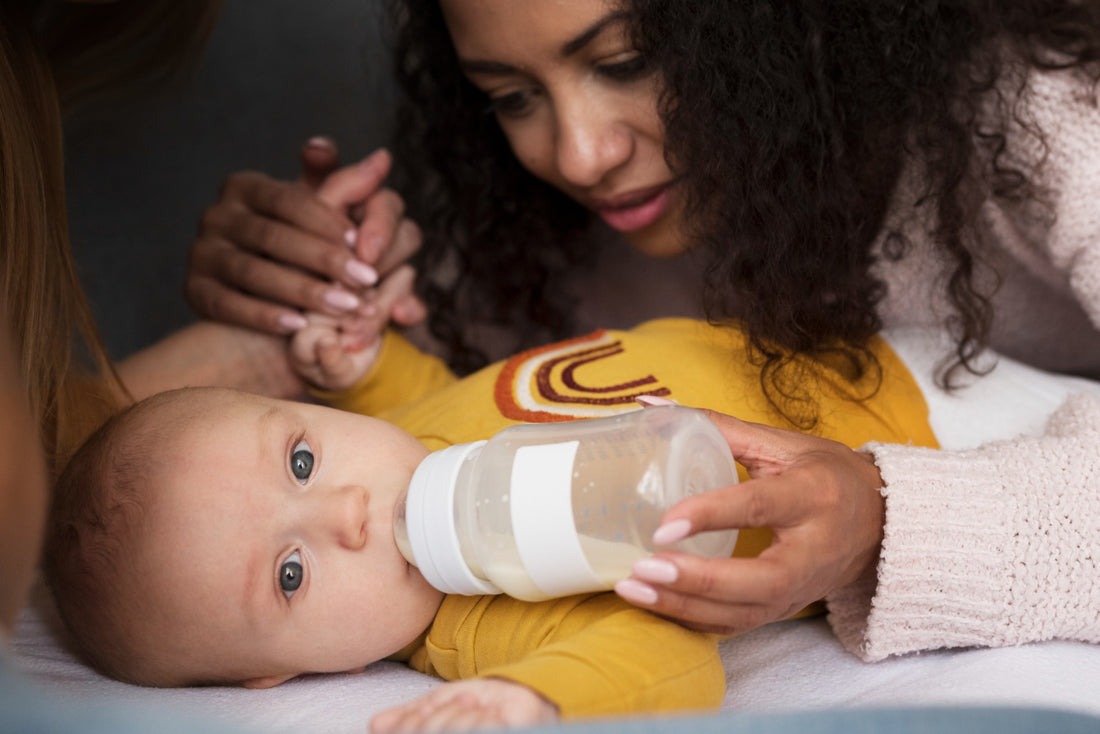It is possible for anyone, including babies, to get hiccups. Adults may consider them an inconvenience or a minor inconvenience. The most common way to get rid of hiccups is to simply wait them out.
Even though hiccups can be annoying for adults and older children, they are usually a short-lived experience for babies. Hiccups are also usually not a problem for babies.
"Hiccups in babies are a common natural reflex, according to Hilary Stempel, MD, MPH, assistant professor of pediatrics at the University of Colorado School of Medicine.
Hiccups in babies are rarely a cause for concern, according to Dr. Rubber stamp. When you know what to do, you can prevent and even stop hiccups in babies.

Why do babies get hiccups?
Hiccups in infants begin even before they are born as a reflex. Sneezing or coughing, too, are reflexive actions that cannot be stopped or controlled.
Hiccups are thought to be caused by a variety of triggers. Although stress, esophageal irritation, and excessive stomach air may all contribute to hiccups, no clear cause has been identified.
The cause of hiccups is unknown at this point, and doctors usually worry more about their caregivers than their babies," says Dr. Rubber stamp.
Although breathing and hiccupping are closely related, studies have found that the two mechanisms are not linked; they seem to be independent of each other. Your body won't cause you to hiccup instead of breathing.
It may sound particularly precarious for babies to go through this process. Infants with healthy respiratory, heart, and oxygen saturation aren't seriously affected by typical bouts of hiccups.
Baby hiccups: Here's what you need to know
women can see fetuses hiccupping. Occasionally, parents can even feel their child's hiccups through their belly. Dr. Rubber Stamp explains that many pregnant women experience their babies hiccupping while pregnant, and that these hiccups will continue after the baby is born, usually without reason.
Newborns also have a strong hiccupping reflex. The number of hiccups used by newborns is estimated to be 2.5%.2 As babies grow during the first few months of life, hiccups tend to decrease.
Dr. Rubber stamp advises to appreciate baby hiccups! They are not a cause for concern, and you can bond with your child while he or she is hiccupping.
The Best Way to Prevent Hiccups in Babies
Despite the fact that hiccups in babies are usually harmless, there are ways to prevent them. Some of the following solutions may help your baby hiccup less often or feel more comfortable when they hiccup.
Monitor hiccup timing
The first step is to notice when your baby is having hiccups. The hiccups could be triggered by certain moments, such as after your baby's feeding or when they are laid in a particular position. Feeding your baby or placing them in a different position might work for you.
Feed less food more often and less often
It may help to give your baby a little less at each feeding if you are breastfeeding or bottle-feeding.5 Research suggests that overfeeding or feeding too fast can cause hiccups.
Additionally, observe how often they nurse or drink from a bottle. Hiccups can be caused by taking in air along with milk or formula when they are drinking too fast.
Regularly burp your baby
Every time your baby feeds, burp him or her. Your baby's hiccups can be caused by trapped air bubbles when he or she is eating. They can clear their esophagus by burping.
Make sure the bottle of your baby is clean
Baby's bottle could be causing hiccups if they are a major problem. The design of some bottles will trap more air during feeding than others. Change the brand or type of bottle to see if it reduces the amount of air.
Hiccups in Babies: What to do
Babies are not at risk from occasional hiccups. It is normal for an infant to experience them from time to time. A hiccup usually ends as suddenly as it began, says Dr. Rubber stamp. Even so, if your baby starts experiencing hiccups, you can try these tips.
The back of your baby should be rubbed
Your baby's back can be rubbed in a circular motion to relieve excess air and stop hiccups. It can be comforting for your baby to watch this motion, even if they continue.
Make sure your baby is burped
During feeding, burp your baby if he or she starts hiccupping. In addition to relieving discomfort, burping can also stop hiccups.
Position your baby differently
If your baby is lying down or propped up in a sitting position when the hiccups begin, it's okay to do so. Baby hiccups cannot always be stopped by changing positions, but changing positions can help.

Your baby will feel soothed by a pacifier
Pacifiers may ease diaphragm spasms in babies who are hiccupping by sucking.
The herb-infused water gripe water, used to treat hiccups in babies and upset stomachs, is another product people use. It is not recommended for use on babies as it is not particularly effective or safe. Before using it, talk to your child's pediatrician.6
Grip water is revered by many parents around the world, but studies have not shown it to be useful, and it can have adverse effects. As gripe water products are not rigorously regulated, they may interfere with breastfeeding and proper nutrition, according to health experts.
A Pediatrician's Advice on When to See One
It is best to consult a doctor if your baby is hiccupping excessively and/or is in pain due to the hiccups. There may be digestive problems with your baby.7
Seeing your pediatrician is a good idea if your child's hiccups always come with spit-up, irritability, or fussing. Dr. Rubber stamp explains that your pediatrician will take into account the entire picture, including your baby's growth, and determine if something like gastroesophageal reflux (GERD) may be causing hiccups.
Hiccups can sometimes be caused by GERD, also known as acid reflux.1 A pediatrician should be consulted if your baby's hiccups are accompanied by vomiting.
Here's a word from Verywell
The human body begins hiccupping well before birth as a normal function. We still do not know why our bodies hiccup, but there are many theories about why they do.
As your baby gets older, hiccups will become less common (especially with newborns). Consult your pediatrician if your baby is experiencing pain or discomfort from hiccups, or if they are vomiting during the hiccups.

